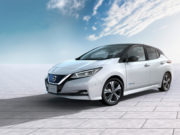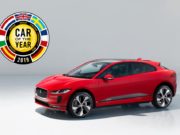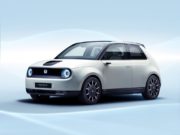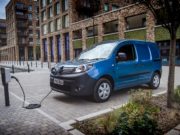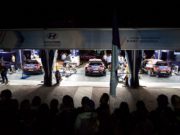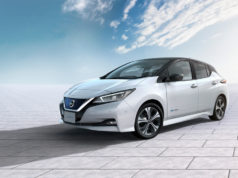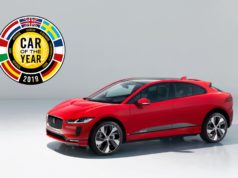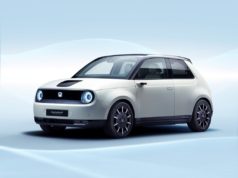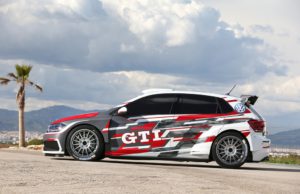Design study, technology demonstrator, mobility concept: the Audi Aicon exploits every possibility offered by an autonomous luxury saloon of the future with unprecedented consistency. As a design study, the four-door 2+2 boldly leaps ahead to show the exterior and interior design of the next decades. The technology demonstrator combines innovations relating to the drivetrain, suspension, digitalization and sustainability in a visionary manner.
And as a mobility concept, the Audi Aicon shows the world of tomorrow, in which the advantages of door-to-door individual transportation are in combination with the luxurious ambiance of a first-class airline cabin. A cabin with no steering wheel or pedals that can thus offer all the comforts of modern communications electronics and perfect ergonomics – simply first-class.
One look is all it takes. In contrast to a robot taxi, which is pure functionality, the autonomous Audi Aicon concept vehicle pulls out all the stops. Its presence is impossible to ignore, and its exterior hints at the spacious comfort afforded the passengers and the upscale technical aspirations. The Audi Aicon is a sneak peak at a prestigious automobile of tomorrow that stirs the desires of demanding customers.
This is how your daily driver could look in 2030 – the Audi AIcon concept unveiled tonight in Frankfurt #IAA2017 pic.twitter.com/QLrsi8HEsy
— Audi UK Press Office (@AudiUKPress) September 11, 2017
Pure presence – the exterior
The Audi Aicon looks spectacular from any angle. Its sheer size – an exterior length of 5,444 millimetres, a width of 2,100 millimetres and a height of 1,506 millimetres – places it in the automotive top tier, the D segment. The wheelbase measures 3,470 millimetres. That’s 240 millimetres (9.4 in) more than with the long version of the new Audi A8.
The central element of the exterior is the cabin. Large glass surfaces at the front and rear as well as the significantly convex side windows create a bright expanse of space for occupants. A distinct edge runs as a hard line along the side window surfaces of the Aicon back to the D-pillar – a first in automotive design. This line emphasises the car’s length and effectively reduces the apparent volume of the cabin relative to the overall body. The darkened side sills rise subtly towards the rear, making it seem like the car is ducking.
The strongly flared wheel wells emphasise Audi’s quattro DNA while simultaneously building a bridge to the latest production creations from the Audi designers. Giant 26-inch wheels are placed as far outward as possible. They underscore the car’s impressive presence.
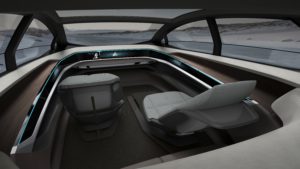 The designers reduced the front and rear ends to a minimum of lines and focused on large, uninterrupted surfaces
The designers reduced the front and rear ends to a minimum of lines and focused on large, uninterrupted surfaces
As with the Audi e-tron Sportback concept, the Aicon front features the inverted hexagonal Singleframe, a typical feature of the upcoming generation of electric cars from Audi. The sharply inclined silhouette of the entire front end evokes a sense of forging ahead – this, too, is a typical sports car body line.
Emotion and information – the LED lighting technology
Conventional headlights and lighting units are absent from both the front and rear of this car. Instead there are fully digital display surfaces comprising hundreds of triangular pixel segments. They are three-dimensional recreations of the Audi AI symbol.
Grouped around the Singleframe are large light fields, in which – as at the rear – more than 600 3D pixels are arranged in space. The large surfaces and high pixel count enable versatile graphics, animations and information visualizations in any colour. The Audi Aicon is thus no longer bound to a daytime running lights look. It can adapt to the driving situation and even its passengers. The customization is boundless.
Horizontally cut lighting segments to the left and right of the Singleframe look like eyes. If the car detects passers-by or other road users, it literally makes eye contact with them and follows them with its “eyes.”
The Audi Aicon supports its surroundings intelligently and uses animations on its display surfaces to warn pedestrians or cyclists of dangerous situations
Driving modes such as platooning, urban driving or driving at a walking pace can be visualized. Horizontal stripes of light move from the bottom up when the car accelerates and in the opposite direction during braking. Their speed increases or decreases in sync with that of the car.
![]() Future cars will expand their sphere of communication to the surroundings. The Audi Aicon uses projector modules to illuminate the road and surroundings in high resolution and project signals onto the ground. This enables it to communicate warnings and vehicle information to passers-by with no direct line of sight to the car.
Future cars will expand their sphere of communication to the surroundings. The Audi Aicon uses projector modules to illuminate the road and surroundings in high resolution and project signals onto the ground. This enables it to communicate warnings and vehicle information to passers-by with no direct line of sight to the car.
One thing that an autonomously driving vehicle of the future definitely won’t need anymore are long-range headlights. The Audi Aicon’s laser and radar sensor system also “sees” enough even in the dark, can reliably find the way and detects possible obstacles in good time. All this time the passengers can use the services provided by myAudi or even close their eyes for a while. When passengers exit the Audi Aicon in the dark, a “light companion” activates: a mini-drone with a flashlight safely illuminates the user’s walking path.
Close-ups of our 2 new concept cars, Audi AIcon an Audi Elaine #AudiIAA #IAA2017 pic.twitter.com/JC7PjQePlB
— Audi Middle East (@AudiMiddleEast) September 12, 2017
Space, form, function – the interior
The Audi Aicon features opposed doors that open to the front and rear. There is no B-pillar. The entire breadth of the interior is thus exposed to the passengers as they enter the car. In the interior, the lines of the decorative surfaces and functional elements are markedly horizontal. Becoming lighter from bottom to top, the interior reinforces the impression of unique spaciousness, and the lack of a steering wheel and a classic dashboard creates a sense of openness and expanse.
This is underscored by the large glass surfaces, the transparent roof and the low waist line. Not to mention the special geometry of the side windows. Their top half angles distinctly outward, so that the maximum width is at eye height.
![]() The interior appears to be particularly wide when the two individual front seats slid all the way back. The Audi Aicon is a 2+2-seater. An upholstered, two-seat bench is integrated into the rear panel. The two front seats offer maximum comfort and optimal spaciousness. Passengers can slide them up to 500 millimetres back and forth between the forward and rear positions. The seats don’t slide on rails, but rather on a platform covered in high-pile carpet that can be moved longitudinally, and on which the passengers’ feet also rest. The platform height is variable, so that it can also become an ottoman for legs. The pitch of the seat cushions and backrests can be steplessly adjusted for a comfortable working or resting position.
The interior appears to be particularly wide when the two individual front seats slid all the way back. The Audi Aicon is a 2+2-seater. An upholstered, two-seat bench is integrated into the rear panel. The two front seats offer maximum comfort and optimal spaciousness. Passengers can slide them up to 500 millimetres back and forth between the forward and rear positions. The seats don’t slide on rails, but rather on a platform covered in high-pile carpet that can be moved longitudinally, and on which the passengers’ feet also rest. The platform height is variable, so that it can also become an ottoman for legs. The pitch of the seat cushions and backrests can be steplessly adjusted for a comfortable working or resting position.
The individual seats can also be swiveled by up to 15 degrees
Turning the seats outward makes it even easier for the passengers to get in. Turning them inward makes it easier for the passengers to talk and interact. If the passengers turn around, the head restraints fold back like a collar and become an arm rest.
The architecture of the seats is the automotive reinterpretation of a classic piece of furniture, the lounge chair. The seat cushion and backrest are visually separated from one another. Two outer shells support the light-coloured, pillow-like upholstery elements with a square-quilted surface. The side bolsters of the backrest have a subtle angle to provide sufficient support in curves.
There is also plenty of space in the Audi Aicon long-distance vehicle for luggage, of course. Thanks to the space-saving design of the electric drive, there is a storage compartment at both the front and the rear of the vehicle with a combined capacity of roughly 660 litres. The Aicon also offers numerous storage options in the passenger compartment.
Accommodating – operation and communication
The oft-cited paradigm change in the automotive world – it shows in the Audi Aicon. One glance is all it takes to realise that all of the controls and displays are missing. Steering wheel, pedals, groups of buttons and instruments – none of these are present. Instead just wide, uninterrupted surfaces. Instead of a dashboard in front of them, there is a generous shelf and the central display below the windshield.
The interior quickly comes to life once passengers enter. Illuminated lines of LEDs set colourful accents in the area of the doors. The front display lights up with a welcome message. PIA, the empathetic electronic vehicle assistant, recognises the passenger by his phone and activates all of his personal settings. There are custom settings for the air conditioning and seating position, interior light colour and the layout of the infotainment system. The navigation system awaits entry of a destination. All accessible channels of communication are ready for use.The connection is via the fastest available standard.
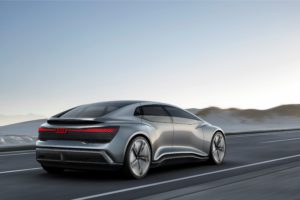 New are the variably positionable control interfaces in the encircling door rail
New are the variably positionable control interfaces in the encircling door rail
Depending on the position of the seats, which can be shifted by up to 50 centimetres, ergonomically perfectly positioned touch and display elements are available in the digitized wrap-around. Your hand instinctively finds its way to the touch-sensitive control panels. Passengers can set the most important settings by tapping with their fingers without having to sit up in their seats or leaning forward. Operation is also interactive. The PIA system is often one step ahead of the passenger and offers services before they actively chose them.
There are multiple input modes available for engaging with the car
Besides the haptic-manual layer, there are also voice control and eye tracking, in which sensors in the front end of the interior track where the passenger is looking. The passenger locks his onto a control element in the area of the front main display to select it and performs fine adjustments using his hand or voice.
The full range of services offered by modern communications electronics are available at all times in the Audi Aicon. Occupants can relax and watch a film or surf the web. Video conferences are another option, as is interaction on social media. Depending on the seating position, the passengers can use the large front display as the output surface or a virtual head-up image displayed above it in the windscreen.
The glass roof panels can block out the sunlight, if desired. Their transparency level changes upon application of an electric voltage. Integrated OLED lighting elements allow for precise mood lighting or the even illumination of the interior when getting in or out of the car, for instance.
The Audi Aicon opens up a new world of mobility to its passengers. Freed from the tasks of driving, they can choose how to spend their time in the car. Working, communicating or simply just relaxing and even napping: Anything is possible while the car autonomously and safely finds its way.
Optimized for the long haul – drivetrain and suspension
The very shape of the Audi Aicon reveals that it is a car from another world, an automobile of the future. The technology presumes a transportation infrastructure in which autonomously driving automobiles are a given on every street. Road users connect to one another and their surroundings.
This also means that traffic will be less hectic and flow more smoothly in the future than is imaginable today. Even at moderate speed limits, you can travel on long distances at a high constant speed of around 80mph. Passengers experience the journey as comfortable cruising without constant braking and accelerating.
Accidents will also be a thing of the past thanks to the highly advanced sensor systems and networking
Passengers in a car like the Audi Aicon will therefore no longer need classic restraint systems. They will also experience a physical sense of freedom during their journey that in 2017 still appears visionary.
The drive and the total vehicle have also been optimally adapted to this new world of mobility. A highly efficient electric drive provides for the dynamics of the Audi Aicon. There are four electric motors in the area of the front and rear axles. The energy storage units are into the area below the floor. These are solid body batteries with considerably more energy capacity than lithium-ion batteries.
The four electric motors produce a total of 260 kW and 550 Newton meters (405.7 lb-ft)
Each drives one wheel, enabling electronically controlled, variable quattro all-wheel drive. Maximum acceleration played a less important role in the specification than maximum efficiency and thus also range. The powertrain and electric brake units, which use recuperation to recover energy, also pursue this operating strategy. Targeted lightweight construction of the multimaterial body and optimised aerodynamics also help the Audi Aicon to achieve ranges of between 434 miles and 497 miles on a single charge.
Even charging has been reduced to a minimum. Thanks to a high-voltage system with 800 volts, the Aicon’s battery unit charges to 80 percent of capacity in less than 30 minutes. The car also has a unit of inductive, i.e. wireless, charging. The Aicon manages both without a driver. In an AI Zone, it can pull up to a charging station on its own and charge its battery without any human assistance.
As a true quattro, the Audi Aicon offers ample performance and even autonomously always reaches its destination safely regardless of the weather or road surface
The suspension is designed for maximum comfort. Pneumatic spring and damper units smoothe out any road surface irregularities. And electric actuators at all four wheels actively counteract any body lean, whether when cornering, accelerating or braking. As a fully active suspension system, it also optimises the qualities of the adaptive air suspension. The Audi Aicon literally glides over even large potholes.
![]() The Aicon brakes primarily by way of recuperation and in so doing recharges the batteries. The development engineers have relocated the disc brakes from the wheels to a position close to the drivetrain. This improves the aerodynamics at the wheels as there is no longer any need for air cooling at the wheels, which is always associated with turbulence. Another secondary effect is the reduction of the unsprung masses, which the Aicon’s passengers perceive as a particularly sensitive damping response to road surface irregularities.
The Aicon brakes primarily by way of recuperation and in so doing recharges the batteries. The development engineers have relocated the disc brakes from the wheels to a position close to the drivetrain. This improves the aerodynamics at the wheels as there is no longer any need for air cooling at the wheels, which is always associated with turbulence. Another secondary effect is the reduction of the unsprung masses, which the Aicon’s passengers perceive as a particularly sensitive damping response to road surface irregularities.
The axle and drive units in the Audi Aicon are symmetrical, i.e. identical at the front and rear. The engineers eliminated mechanical components, such as the steering shaft or steering hydraulics. The car therefore has a complete all-wheel steering system without compromising the available space and thus the passenger compartment. A positive effect for the practical qualities of the Audi Aicon: Despite its long wheelbase of nearly 3.47 metres, the car is extremely agile due to its two steerable axles – the turning radius of only 8.50 metres is below that of a small car thus making the Audi Aicon suitable for city centre driving.
The Audi Aicon offers maximum comfort, communications technology and freedom for its occupants during a long journey
It combines the scopes for autonomous driving in an urban environment and on the highway with an unprecedented range for an electric drive. Further multitalented Audi models will follow the Aicon, each with their own specialised discipline, ensuring that the vehicle range of the brand with the four rings remains as diverse as it is fascinating.
Stay tuned for the latest #Audi news and highlights from Frankfurt Motor Show. #AudiIAA pic.twitter.com/DHuvqBJkvw
— Audi UK (@AudiUK) September 11, 2017












